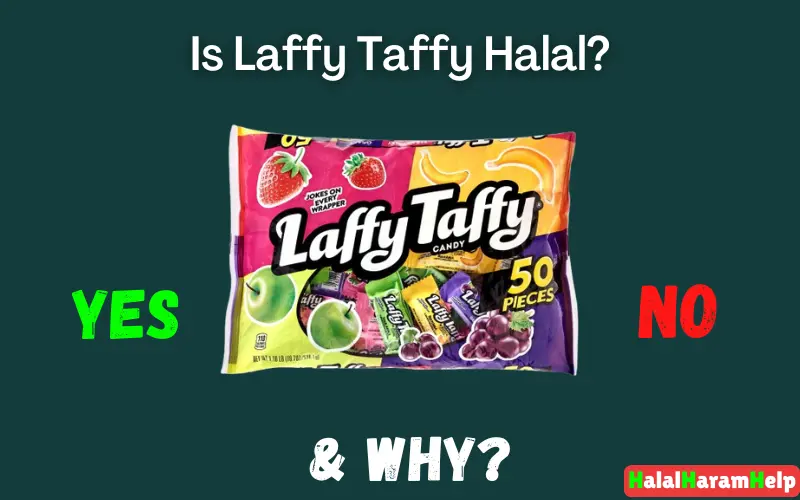If you’re a fan of Laffy Taffy and follow a halal diet, you might be wondering whether this chewy candy fits into your dietary guidelines.
The halal status of Laffy Taffy isn’t straightforward, as it depends on the specific ingredients used, which can vary by flavor and region.
While some varieties may be halal-friendly, others might contain non-halal ingredients like gelatin.
Hence, in this article, we’ll explore what to look for when identifying halal products and help you determine whether Laffy Taffy is a safe choice for Muslims.

Is Laffy Taffy Halal?
No, Laffy Taffy is not entirely halal. However, some varieties of this popular candy may be considered halal depending on the ingredients used.
The halal status of Laffy Taffy largely depends on the presence of certain ingredients, particularly gelatin, which is often derived from animal sources and is not permissible under Islamic dietary laws.
Let’s dive deeper into why this chewy candy is a gray area for Muslims and how you can determine whether a particular Laffy Taffy product is suitable for halal consumption.
You can also see are Funyuns halal.
Understanding Halal And Haram Ingredients
To understand whether Laffy Taffy is halal, it’s essential to grasp some basics about halal (permissible) and haram (forbidden) ingredients in Islam.
Halal foods meet Islamic dietary requirements, while haram foods are explicitly prohibited.
Common haram ingredients include pork products, alco**, and any substances derived from animals not slaughtered according to Islamic rites.
One of the most common haram ingredients found in candies like Laffy Taffy is gelatin, which is often made from pork or other non-halal animal sources.
Does Laffy Taffy Contain Gelatin?
Gelatin is a key factor in determining whether a candy is halal. This protein, used as a thickener or stabilizer in many chewy candies, is usually made from the collagen found in animal bones and connective tissues.
Unfortunately, gelatin in most mainstream candies, including some flavors of Laffy Taffy, is sourced from non-halal animals like pigs or non-halal-slaughtered cows.
This makes these versions of Laffy Taffy haram for Muslims to consume.
However, not all Laffy Taffy products contain gelatin. Some varieties, particularly the mini and stretchier versions, may use alternative ingredients, which could potentially make them permissible for halal diets.
This is why checking the specific ingredient list of each product is crucial before deciding whether it’s suitable for consumption.
Also see is Starburst halal.
Variations By Country And Region
One important point to note is that the ingredients in Laffy Taffy can vary depending on the country of production.
In certain countries, where dietary restrictions are stricter or there is a greater demand for halal products, manufacturers might adjust the recipe to avoid ingredients like gelatin.
As a result, Laffy Taffy sold in one region might be halal, while the same candy sold elsewhere could contain non-halal ingredients.
For example, in predominantly Muslim countries or regions where halal certification is more prevalent, you might find Laffy Taffy products that are more likely to be halal-compliant.
In contrast, products sold in other regions may not undergo the same scrutiny and could include haram ingredients.
This variation makes it even more important for consumers to carefully check the labels and certifications of Laffy Taffy in their local stores.
How To Check If Laffy Taffy Is Halal?
Since the halal status of Laffy Taffy can vary by flavor and region, it’s important to take a few steps to verify whether the product you’re about to consume is permissible. Here are some guidelines:
1. Read the Ingredients List Carefully
Start by examining the ingredient list on the packaging. Look out for common haram ingredients such as gelatin, alco**, or any derivatives from pork.
If gelatin is listed without specifying its source, it’s best to avoid the product unless you can verify that it is derived from a halal source.
2. Look For Halal Certification
Some products are labeled with a halal certification, indicating they meet the dietary guidelines of Islam.
In countries with a significant Muslim population, such as Malaysia or Indonesia, it’s more likely that candy brands will seek out certification.
If you see a halal certification logo on the packaging, it’s a good sign that the product is safe for consumption.
3. Contact The Manufacturer
If the label isn’t clear or you still have doubts, don’t hesitate to reach out to the manufacturer directly.
Most companies are happy to clarify the source of specific ingredients, especially gelatin, and confirm whether their product is suitable for a halal diet.
Common Ingredients In Laffy Taffy
While gelatin is one of the more concerning ingredients in Laffy Taffy, other ingredients are generally permissible but still worth understanding. Here’s a breakdown of the most common ingredients:
Corn Syrup: A sweetener made from corn starch, commonly used in candies. This is halal.
Sugar: Derived from sugar cane or beets, and generally halal unless processed with animal-derived agents.
Palm Oil: A vegetable oil that is halal, though some people prefer sustainably sourced palm oil for ethical reasons.
Mono and Diglycerides: These emulsifiers can be plant- or animal-based. If they come from a plant source, they’re halal. However, if derived from animals, their halal status depends on how the animals were slaughtered.
Artificial Colors and Flavors: These ingredients are usually synthetic and halal, but some prefer to avoid them due to concerns about artificial additives.
You might also like is Candy Corn halal.
Conclusion
While Laffy Taffy is not entirely halal, some flavors may be acceptable depending on their ingredients.
It’s crucial to check the label for haram ingredients like gelatin and look for halal certifications when available.
When in doubt, contacting the manufacturer for clarification or avoiding the product altogether is the safest option.
Until there’s a clear halal certification, Muslims should be cautious and choose alternatives that are guaranteed to meet Islamic dietary standards.


